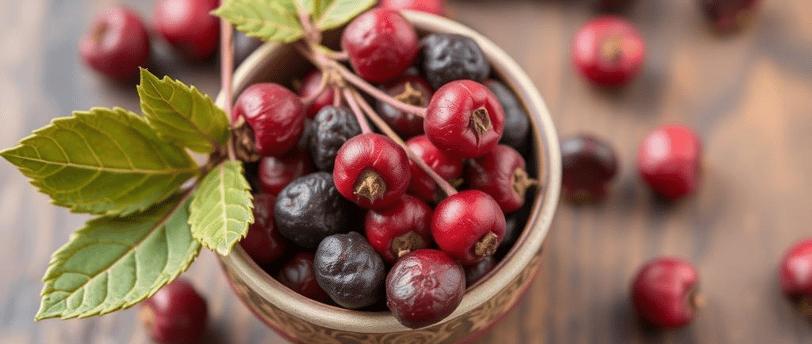Schisandra for Heart Health: The Adaptogenic Berry That Protects Your Cardiovascular System
❤️HEART HEALTH


In the realm of herbal medicine, Schisandra chinensis stands out as a powerful adaptogenic berry with a rich history rooted in traditional Chinese medicine. Particularly celebrated for its ability to enhance overall vitality, Schisandra has garnered attention for its potential role in supporting heart health. This article delves into the forms available, recommended recipes, dosage guidelines, potential side effects, precautions, and, most importantly, the scientific basis for Schisandra's cardiovascular benefits.
Understanding Schisandra: A Brief Overview
Schisandra, often referred to as the "five-flavor fruit," is a berry native to the forests of Northern China. The five flavors refer to its unique taste that encompasses sweetness, sourness, bitterness, spiciness, and salinity. This distinct profile is more than a sensory delight; it signifies the herb's multifaceted effects on the body. Schisandra berries have been used for centuries to increase energy, improve endurance, and promote overall wellness, further positioning it as a powerful adaptogen.
Forms Available
Schisandra is available in a variety of forms, making it accessible for all types of herbal enthusiasts. The primary forms include:
Fresh Berries: These can sometimes be found in health food stores or specialty shops. They can also be foraged if you’re in their native region.
Dried Berries: Dried Schisandra berries are widely available and can be used in teas or as a snack.
Powdered Form: The dried berries can be ground into a powder, easily incorporated into smoothies or energy bars.
Tinctures: Alcohol or glycerin-based extracts offer a concentrated dose of Schisandra’s benefits and are available at many herbal shops.
Capsules: For those who prefer a standardized dosage without the taste, Schisandra extract capsules are an ideal choice.
Recommended Recipes
Incorporating Schisandra into your daily routine can be both easy and delicious. Here are a few simple recipes:
1. Schisandra Tea
Ingredients:
1 tablespoon dried Schisandra berries
2 cups boiling water
Honey or lemon (optional)
Instructions:
Place the dried berries in a teapot or heatproof container.
Pour boiling water over the berries and steep for 15-20 minutes.
Strain the tea into a cup, and add honey or lemon to taste.
2. Schisandra Smoothie
Ingredients:
1 teaspoon Schisandra berry powder
1 cup of almond milk
1 banana
1 tablespoon of honey or maple syrup
A handful of spinach (optional)
Instructions:
Combine all ingredients in a blender.
Blend until smooth and enjoy a nutrient-packed treat.
3. Schisandra Energy Bars
Ingredients:
1 cup dates, pitted
1 cup nuts ( almonds, walnuts, or cashews)
2 tablespoons Schisandra powder
A pinch of salt
Instructions:
Place all ingredients in a food processor and blend until a sticky mixture forms.
Press the mixture into a lined baking tray and refrigerate until firm.
Cut into bars and enjoy as an energizing snack.
Dosage
The dosage of Schisandra varies based on the form used. A general guideline is:
Dried Berries: 1-3 grams daily.
Powder: 1-3 teaspoons daily.
Tincture: 1-2 droppers full up to three times a day.
Capsules: Follow the manufacturer's instructions, typically 300-600 mg a day.
It is advisable to start with a lower dose and gradually increase it to assess individual tolerance. Consulting a healthcare professional before initiating any herbal regimen is recommended, particularly for those with underlying health conditions or those taking medications.
Side Effects and Precautions
While Schisandra is generally considered safe for most individuals, it can cause side effects in some cases. Common side effects may include:
Gastrointestinal Issues: Nausea, stomach upset, or diarrhea when taken in excessive doses.
Allergic Reactions: Rarely, individual allergic reactions may occur.
Insomnia: Some users report difficulty sleeping, particularly with higher doses.
Precautions
Pregnancy and Breastfeeding: Women who are pregnant or breastfeeding should avoid Schisandra due to limited research on its safety.
Medical Conditions: Individuals with liver disease or those taking anticoagulant medications should seek medical advice, as Schisandra may influence blood clotting.
Drug Interactions: Schisandra can interact with certain medications, such as sedatives and blood thinners.
Scientific Basis for Heart Health Benefits
Several studies highlight the cardiovascular benefits of Schisandra, primarily linked to its antioxidant, anti-inflammatory, and adaptogenic properties.
1. Antioxidant Effects
Schisandra is rich in lignans, a type of polyphenolic compound praised for its antioxidant capacity. Antioxidants combat oxidative stress, a contributor to chronic diseases, including heart disease. By reducing oxidative damage, Schisandra may help maintain healthy blood vessels and lower the risk of cardiovascular complications.
2. Cardioprotective Properties
Research suggests that the compounds in Schisandra can help protect against myocardial ischemia (restricted blood flow to the heart), promoting better heart function. A study published in the journal PLOS One indicated that Schisandra extract can improve heart muscle recovery following injury, demonstrating its potential therapeutic role in cardiovascular health.
3. Regulating Blood Pressure
Some studies have indicated that Schisandra may have a role in regulating blood pressure. By improving endothelial function and promoting vascular relaxation, Schisandra can contribute to maintaining healthy blood pressure levels, a crucial aspect of cardiovascular wellness.
Conclusion
As an adaptogenic berry, Schisandra shows promise not only for enhancing overall vitality but also for protecting heart health. With various forms available and a rich array of ways to incorporate it into your diet, Schisandra can be an excellent addition to a heart-friendly lifestyle. However, it is essential to consider dosage, potential side effects, and consultations with healthcare providers to ensure the best outcomes. As research continues to explore the scientific basis of Schisandra’s benefits, this remarkable berry reaffirms its place in the world of natural heart health solutions.
